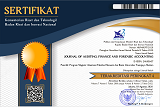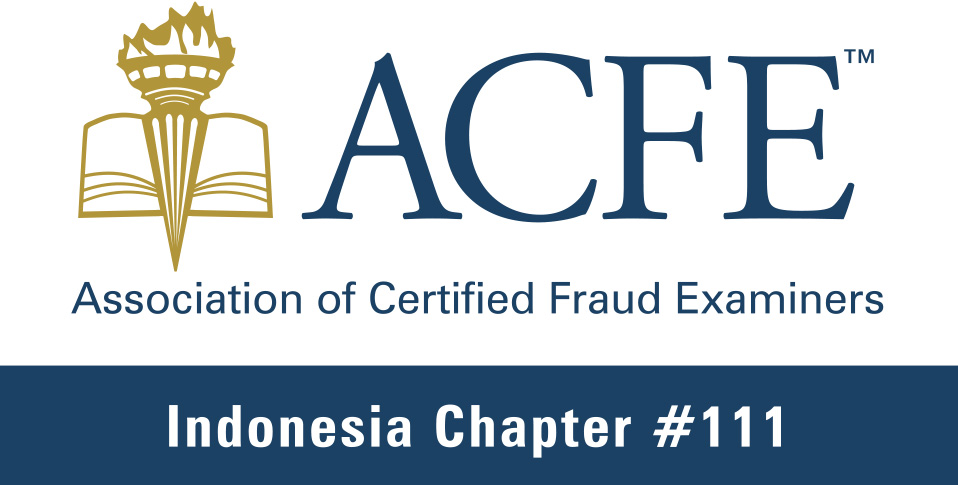Corporate Social Responsibility and Tax Avoidance: Does Financial Performance Matters?
Abstract
This study aims to examine the relationship between corporate social responsibility (CSR) and tax avoidance in Indonesia. The moderating effect of financial performance as measured by Return on Asset (ROA) is also examined in this study. The researcher examined 312 samples of OSIRIS 2022–2024 companies using Eviews. The results of the study show that CSR has a positive impact on tax avoidance and that financial performance does not mitigate this effect. The findings show that the company is doing CSR as a hedging measure. Therefore, this study adds to the evidence that companies do CSR and pay taxes to demonstrate the implementation of risk management.
Keywords
Full Text:
PDFReferences
Abdelfattah, T., & Aboud, A. (2020). Tax Avoidance, Corporate Governance, and Corporate Social Responsibility: The Case of the Egyptian Capital Market. Journal of International Accounting, Auditing and Taxation, 38, 100304. https://doi.org/10.1016/j.intaccaudtax.2020.100304.
Abid, S., & Dammak, S. (2022). Corporate Social Responsibility and Tax Avoidance: The Case of French Companies. Journal of Financial Reporting and Accounting, 20(3-4), 618–638. https://doi.org/10.1108/JFRA-04-2020-0119.
Ajupov, A., Sherstobitova, A., Syrotiuk, S., & Karataev, A. (2019). The Risk-Management Theory in Modern Economic Conditions. E3S Web of Conferences, 110. https://doi.org/10.1051/e3sconf/201911002040.
Almutairi, A. M., & Abdelazim, S. I. (2025). The Impact of CSR on Tax Avoidance: The Moderating Role of Political Connections. Sustainability (Switzerland), 17(1), 195. https://doi.org/10.3390/su17010195.
Alsaadi, A. (2020). Financial-Tax Reporting Conformity, Tax Avoidance and Corporate Social Responsibility. Journal of Financial Reporting and Accounting, 18(3), 639–659. https://doi.org/10.1108/JFRA-10-2019-0133.
Aparicio, K., & Kim, R. (2023). External Capital Market Frictions, Corporate Governance, and Tax Avoidance: Evidence from the TED Spread. Finance Research Letters, 52, 103381. https://doi.org/10.1016/j.frl.2022.103381.
Armstrong, C. S., Glaeser, S., & Kepler, J. D. (2019). Strategic Reactions In Corporate Tax Planning. Journal of Accounting and Economics, 68(1), 101232. https://doi.org/10.1016/j.jacceco.2019.03.003.
Benlemlih, M., Jaballah, J., Schochet, S., & Peillex, J. (2023). Corporate Social Responsibility and Corporate Tax Avoidance: The Channel Effect of Consumer Awareness. Journal of Business Finance and Accounting, 50(1–2), 31–60. https://doi.org/10.1111/jbfa.12638.
Brighi, P., Della Bina, A. C. F., & Venturelli, V. (2025). Firm Value and Risk: How Relevant Are ESG Factors and ESG Controversies? Journal of Financial Reporting and Accounting. https://doi.org/10.1108/JFRA-12-2024-0953.
Chen, J., Chen, D., Liu, L., & Wang, Z. (2021). Returnee Directors and Corporate Tax Avoidance. Journal of Accounting, Auditing and Finance, 38(4), 882-907. https://doi.org/10.1177/0148558X211017356.
Chen, S., Chen, X., Cheng, Q., & Shevlin, T. (2010). Are Family Firms More Tax Aggressive than Non-Family Firms? Journal of Financial Economics, 95(1), 41–61. https://doi.org/10.1016/j.jfineco.2009.02.003.
Chouaibi, J., Rossi, M., & Abdessamed, N. (2022). The Effect of Corporate Social Responsibility Practices on Tax Avoidance: An Empirical Study in the French Context. Competitiveness Review, 32(3), 326–349. https://doi.org/10.1108/CR-04-2021-0062.
Coelho, R., Jayantilal, S., & Ferreira, J. J. (2023). The Impact of Social Responsibility on Corporate Financial Performance: A Systematic Literature Review. Corporate Social Responsibility and Environmental Management, 30(4), 1535–1560. https://doi.org/10.1002/csr.2446.
D’Agoôt, M. (2020). Assessing the Utility of Risk Management Theory in the Governance of New States: Lessons from South Sudan. Journal of Risk Research, 23(2), 210–226. https://doi.org/10.1080/13669877.2019.1569089.
Davis, A. K., Guenther, D. A., Krull, L. K., & Williams, B. M. (2016). Do Socially Responsible Firms Pay More Taxes? Accounting Review, 91(1), 47–68. https://doi.org/10.2308/accr-51224.
Forson, J. A., Kuranchie-Pong, R., Kusi, B. A., Mbilla, S. A. E., Yamoah, A., & Aduko, C. (2025). Evaluating the Effect of Internal Control Mechanisms on Banks’ Performance in Ghana: The Moderating Role of Internal Audit Effectiveness. Journal of Economic and Administrative Sciences. https://doi.org/10.1108/JEAS-12-2024-0525.
Frank, M. M., Lynch, L. J., & Rego, S. O. (2009). Tax Reporting Aggressiveness and Its Relation Financial Reporting. Accounting Review, 84(2), 467–496. https://doi.org/10.2308/accr.2009.84.2.467.
Garrett, J., Hoitash, R., & Prawitt, D. F. (2014). Trust and Financial Reporting Quality. Journal of Accounting Research, 52(5), 1087–1125. https://doi.org/10.1111/1475-679X.12063.
Giannarou, L., & Tzeremes, P. (2025). CSR Performance and Corporate Tax Avoidance in the Hospitality and Tourism Industry: Do Women Directors Moderate this Relationship?. International Hospitality Review. https://doi.org/10.1108/ihr-08-2024-0037.
Godfrey, P. C. (2005). The Relationship between Corporate Philanthropy and Shareholder Wealth: A Risk Management Perspective. Academy of Management Review, 30(4), 777–798. https://doi.org/10.5465/AMR.2005.18378878.
Gulzar, M. A., Cherian, J., Sial, M. S., Badulescu, A., Thu, P. A., Badulescu, D., & Khuong, N. V. (2018). Does Corporate Social Responsibility Influence Corporate Tax Avoidance of Chinese Listed Companies? Sustainability (Switzerland), 10(12), 4549. https://doi.org/10.3390/su10124549.
Habib, J. (2025). Climate Change Risk and Corporate Risk-Taking: Do Board Gender Diversity and Environment, Social and Governance Performance Matter? International Journal of Climate Change Strategies and Management, 17(1), 938–962. https://doi.org/10.1108/IJCCSM-01-2025-0016.
Hanlon, M., & Heitzman, S. (2010). A Review of Tax Research. Journal of Accounting and Economics, 50(2–3), 127–178. https://doi.org/10.1016/j.jacceco.2010.09.002.
Haque, T., Pham, T. P., & Yang, J. (2023). Geopolitical Risk, Financial Constraints, and Tax Avoidance. Journal of International Financial Markets, Institutions and Money, 88, 101858. https://doi.org/10.1016/j.intfin.2023.101858.
Harymawan, I., Putra, F. K. G., Fianto, B. A., & Wan Ismail, W. A. (2021). Financially Distressed Firms: Environmental, Social, and Governance Reporting in Indonesia. Sustainability (Switzerland), 13(18), 10156. https://doi.org/10.3390/su131810156.
Hidayat, K., & Zuhroh, D. (2023). The Impact of Environmental, Social and Governance, Sustainable Financial Performance, Ownership Structure, and Composition of Company Directors on Tax Avoidance: Evidence from Indonesia. International Journal of Energy Economics and Policy, 13(6), 311–320. https://doi.org/10.32479/ijeep.14557.
Hilling, A., Lundtofte, F., Sandell, N., Sonnerfeldt, A., & Vilhelmsson, A. (2021). Tax Avoidance and State Ownership — The Case of Sweden. Economics Letters, 208, 110063. https://doi.org/10.1016/j.econlet.2021.110063.
Islam, M. S. U., Wong, W. -C., & Yusoff, M. Y. B. M. (2023). Types of Political Connections, Election Years, and Firm Performance in Pakistan: Moderating Role of External Monitoring. Cogent Business & Management, 10(2). https://doi.org/10.1080/23311975.2023.2224139.
Jemiolo, S., & Farnsel, C. (2023). Complements, Substitutes or Neither? A Review of the Relation between Corporate Social Responsibility and Corporate Tax Avoidance. Journal of Accounting Literature, 45(3), 474–496. https://doi.org/10.1108/jal-12-2021-0018.
Jiang, W., Zhang, C., & Si, C. (2022). The Real Effect of Mandatory CSR Disclosure: Evidence of Corporate Tax Avoidance. Technological Forecasting and Social Change, 179, 121646. https://doi.org/10.1016/j.techfore.2022.121646.
Jin, M., Liu, J., & Chen, Z. (2022). Impacts of Social Trust on Corporate Leverage: Evidence from China. International Review of Economics & Finance, 77, 505–521. https://doi.org/10.1016/j.iref.2021.10.018.
Karavitis, P., Kazakis, P., & Xu, T. (2025). Overconfident CEOs, Corporate Social Responsibility, and Tax Avoidance: Evidence from China. Journal of International Accounting, Auditing and Taxation, 59, 100702. https://doi.org/10.1016/j.intaccaudtax.2025.100702.
Karlinah, L., Meutia, M., Hanifah, I. A., & Ismawati, I. (2024). How Does Financial Performance Moderate the Effect of Corporate Governance Mechanisms on Tax Avoidance? Quality - Access to Success, 25(201), 292–302. https://doi.org/10.47750/QAS/25.201.32.
Kementerian Keuangan. (2024). Buku Informasi APBN TA 2024: Mempercepat Transformasi Ekonomi yang Inklusif dan Berkelanjutan. Publikasi Kemenkeu RI, 1, 1–54. https://anggaran.kemenkeu.go.id/api/Medias/454fb34d-dd52-4edf-a6cc-e443f06fe44f.
Kovermann, J., & Velte, P. (2021). CSR and Tax Avoidance: A Review of Empirical Research. Corporate Ownership and Control, 18(2), 20–39. https://doi.org/10.22495/cocv18i2art2.
Krieg., K. S., & Li, J. (2021). A Review of Corporate Social Responsibility and Reputational Costs in the Tax Avoidance Literature. Accessed at https://papers.ssrn.com/sol3/papers.cfm?abstract_id=3776441.
Lanis, R., & Richardson, G. (2015). Is Corporate Social Responsibility Performance Associated with Tax Avoidance? Journal of Business Ethics, 127, 439–457. https://doi.org/10.1007/s10551-014-2052-8
Lucut Capras, I., Achim, M. V., & Mara, E. R. (2024). Is Tax Avoidance One of the Purposes of Financial Data Manipulation? The Case of Romania. Journal of Risk Finance, 25(4), 588–601. https://doi.org/10.1108/JRF-11-2023-0273.
Machdar, N. M. (2022). Does Tax Avoidance, Deferred Tax Expenses and Deferred Tax Liabilities Affect Real Earnings Management? Evidence from Indonesia. Institutions and Economies, 14(2), 117–148. https://doi.org/10.22452/IJIE.vol14no2.5.
Maquieira, C. P., Arias, J. T., & Espinosa-Méndez, C. (2024). The Impact of ESG on the Default Risk of Family Firms: International Evidence. Research in International Business and Finance, 67(Part A), 102136. https://doi.org/10.1016/j.ribaf.2023.102136.
Mesa-Pérez, E., Mateo-Márquez, A. J., Carrión, E., & Antonini, C. (2025). Corporate Water Risk Reporting: The Case of the CDP Water Security Questionnaire. Sustainability Accounting, Management and Policy Journal, 16(6), 1653–1689. https://doi.org/10.1108/SAMPJ-07-2023-0453.
Ariff, A. M., Kamarudin, K. A., Musa, A. Z., & Mohamad, N. A. (2024). Financial Constraints, Corporate Tax Avoidance and Environmental, Social and Governance Performance. Corporate Governance, 24(7), 1525–1546. https://doi.org/10.1108/CG-08-2023-0343.
Mousa, R., Nabil, J., Safty, A., Hassan, I., & Ibrahim, Y. (2025). Liquidity–Credit Risk Dynamics and Bank Profitability: Hybrid Econometric and Machine Learning Evidence from MENA. Journal of Financial Reporting and Accounting. https://doi.org/10.1108/JFRA-04-2025-0291.
Nurtanto, D. R., & Wulandari, S. (2024). Pengaruh Corporate Social Responsibility, Leverage dan Profitabilitas terhadap Penghindaran Pajak. Jurnal Ilmiah MEA (Manajemen, Ekonomi, dan Akuntansi), 8(1), 734–752. https://doi.org/10.31955/mea.v8i1.3723.
Okuyama, A., Tsugawa, S., Matsunaga, C., & Managi, S. (2025). Companies Adjust Tax Payments to Offset Changes in Publicly Perceived Impact on Environment, Social, and Governance Factors. Humanities and Social Sciences Communications, 12, 115. https://doi.org/10.1057/s41599-024-04199-4.
Postiglione, M., Carini, C., & Falini, A. (2025). Assessing Firm ESG Performance Through Corporate Survival: The Moderating Role of Firm Size. International Review of Financial Analysis, 100, 103973. https://doi.org/10.1016/j.irfa.2025.103973.
Rafika, A. N. M., Bulutoding, L., & Syariati, N. E. (2022). Pengaruh CSR dan Efek Karakteristik Perusahaan terhadap Tax Avoidance dengan Kinerja Keuangan sebagai Variabel Moderasi. ISAFIR: Islamic Accounting and Finance Review, 3(2), 204–217. https://doi.org/10.24252/isafir.v3i2.30915.
Santo, V. A., Manalu, M. A., & Angeline, F. (2025). Pengaruh Kinerja Keuangan dan Tata Kelola Perusahaan terhadap Penghindaran Pajak. Owner: Riset dan Jurnal Akuntansi, 9(2), 994–1004. https://doi.org/10.33395/owner.v9i2.2652.
Saragih, H. A., Adhariani, D., & Djakman, C. D. (2023). Corporate Social Responsibility (CSR) Disclosure, Internationalization and Tax Avoidance: Evidence from Indonesia. Jordan Journal of Business Administration, 19(4), 531–545. https://doi.org/10.35516/jjba.v19i4.1434.
Shaukat Malik, M., Irfan, M., & Munir, S. (2025). Corporate Tax Avoidance and Firm Performance: The Moderating Role of Ownership Concentration and Board Independence. Cogent Business & Management, 12(1), 2448277. https://doi.org/10.1080/23311975.2024.2448277.
Sikka, P. (2010). Smoke and Mirrors: Corporate Social Responsibility and Tax Avoidance. Accounting Forum, 34(3–4), 153–168. https://doi.org/10.1016/j.accfor.2010.05.002.
Sim, J. Y., Cho, J. (J.), & Hong, J. Y. (2024). The Association between Corporate Social Responsibility Activity and Tax Avoidance: A Classical Economic Perspective. Applied Economics Letters, 31(17), 1747–1756. https://doi.org/10.1080/13504851.2023.2206610.
Simamora, S. J. P., & Sari, D. P. (2021). Influence of Independent Director, Female Director, and Thin Capitalization on Tax Avoidance. Journal of Auditing, Finance, and Forensic Accounting, 9(2), 12–23. https://doi.org/10.21107/jaffa.v9i2.12034.
Srairi, S., & Kateb, I. (2025). From ESG to Risk-Taking and Financial Stability: Is Board Gender Diversity the Missing Link in Islamic and Conventional GCC Banks? Journal of Risk Finance. https://doi.org/10.1108/JRF-04-2025-0177.
Stearns, S. C. (2000). Daniel Bernoulli (1738): Evolution and Economics Under Risk. Journal of Biosciences, 25(3), 221–228. https://doi.org/10.1007/BF02703928.
Susanto, A., & Veronica, V. (2022). Pengaruh Corporate Social Responsibility (CSR) dan Karakteristik Perusahaan terhadap Praktik Penghindaran Pajak Perusahaan yang Terdaftar di Bursa Efek Indonesia. Owner: Riset dan Jurnal Akuntansi, 6(1), 541–553. https://doi.org/10.33395/owner.v6i1.551.
Tessema, A. M., Zahir-Ul-Hassan, M. K., & Ahmed, A. (2024). Corporate Governance, Earnings Management and the Moderating Role of Political Connections: Evidence from the Gulf Co-Operation Council Countries. International Journal of Ethics and Systems. https://doi.org/10.1108/IJOES-02-2024-0056.
Velte, P. (2020). Does CEO Power Moderate the Link between ESG Performance and Financial Performance?: A Focus on the German Two-Tier System. Management Research Review, 43(5), 497–520. https://doi.org/10.1108/MRR-04-2019-0182.
Velte, P. (2025). Corporate Social Responsibility (CSR) Decoupling and Tax Avoidance: Symbolic Use of Sustainable Boards in the European Union? Corporate Social Responsibility and Environmental Management, 32(3), 4179–4193. https://doi.org/10.1002/csr.3172.
Warren, S. J., Boston Vogt, E., Tincher, B., & Yang J. (2025). Enhancing Quality Assurance through Strategic Artificial Intelligence Integration: A Framework for Higher Education Digital Transformation. Quality Assurance in Education. https://doi.org/10.1108/QAE-09-2024-0183.
Wiratmoko, S. (2018). The Effect of Corporate Governance, Corporate Social Responsibility, and Financial Performance on Tax Avoidance. The Indonesian Accounting Review, 8(2), 241-253. https://doi.org/10.14414/tiar.v8i2.1673.
Xu, S., Wang, F., Cullinan, C. P., & Dong, N. (2022). Corporate Tax Avoidance and Corporate Social Responsibility Disclosure Readability: Evidence from China. Australian Accounting Review, 32(2), 267–289. https://doi.org/10.1111/auar.12372.
Zattoni, A., Leventis, S., Van Ees, H., & De Masi, S. (2023). Board Diversity’s Antecedents and Consequences: A Review and Research Agenda. Leadership Quarterly, 34(1), 101659. https://doi.org/10.1016/j.leaqua.2022.101659.
DOI: https://doi.org/10.21107/jaffa.v13i2.31646
Refbacks
- There are currently no refbacks.
Our Journal indexed by:
Our support tools using:



This work is licensed under a Creative Commons Attribution 4.0 International License.












